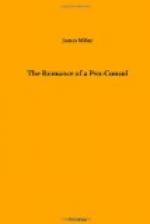He happened to be on leave, from his duties at the fortress, when the famous siege began. He hurried to the neighbourhood, laid hold of a boat, and actually rowed through the Spanish fleet. The British garrison gave him a tremendous reception, and the officers marked his feat by the gift of a gold snuff-box. He was thrice welcome: for himself, for the coolness with which he had broken the blockade, and for the news he brought from the outside.
The precious snuff-box descended to Sir George Grey, an heirloom that suggested an adventure of his own. He was sent to a school at Guildford in Surrey, and he ran away from it. He found the teaching all towards the classics, making for Oxford or Cambridge, and afterwards for a learned profession. His real nature, as modelled chiefly by his mother, was in the direction of public service, with, he hoped, some stir in it. The escape from the school he always related, as if the pages of Robert Louis Stevenson were open in his hand at the flight of Alan Breck among the heather.
’I was determined to get home and tell my folks what I wanted to do. Moreover, the walled playgrounds, the being shut in from nature, the walking in line at exercise—these things were insupportable to me. It was like keeping a boy’s spirit and imagination in prison, instead of allowing them free communion with the world around. Farther, I was angry at boys having been put over me, for their knowledge of classics, who were perfectly ignorant of the higher branches of knowledge at which I had been working. “Clever but idle” was usually the character I got at school. They didn’t understand me, for I studied one subject while they wanted to test me by others.
’Well, accompanied by a boy friend, I climbed over the wall of the school at Guildford, and made for home. My step-father’s place was at Bodiam, about twelve miles from Hastings, and between Bodiam and my London relatives I had lived before going to Guildford. But at this time, if my memory does not mislead me, the family were at Eastbourne. In that case my destination would have been Eastbourne, and I know the route taken was by Brighton. We had left as darkness was falling, and I’m afraid we hadn’t much money for the journey. That scarcely mattered, however, since we were walking, therefore having no outlay unless for food. We slept a night under the cliffs at Brighton, and I don’t doubt we slept very soundly. Boys do, anywhere. People were kind to us, and when asked, we made no secret of the fact that we were fleeing from school.
’It had been arranged, between my companion and myself, that I should take him into our house. At Eastbourne, which we reached sorely tired, our insurgent spirits somewhat calmed, we had quite a lively reception. There appeared to be, on the part of the younger members of the family, a fear lest we should be instantly executed. Nothing so dreadful happened. The other boy was put into communication with his friends, and I had a long holiday. By and by, under the charge of a friend, I returned to Guildford to make explanation and excuse. That done, I went visiting more relations at Cheltenham—I had a lot altogether, you see!—and there I was brought under the influence of Whately, later the renowned Archbishop of Dublin.’




